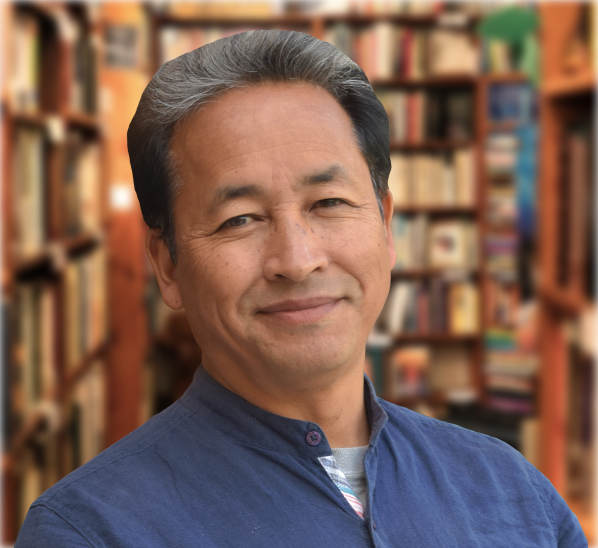In 1998, WANGCHUK opened SECMOL School, focused on rebuilding Ladakhi students’ confidence, developing their lifeskills, and offer courses ranging from leadership training to solar power installation.
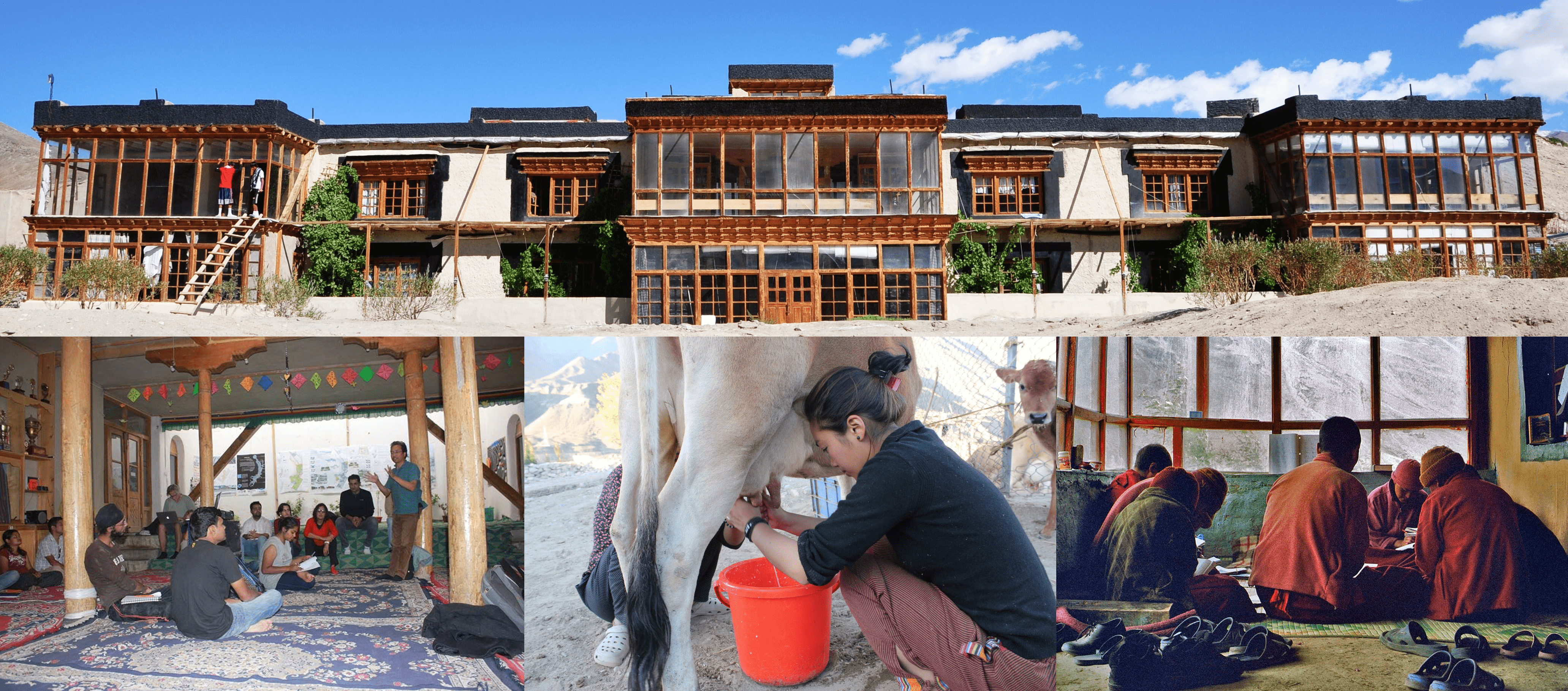
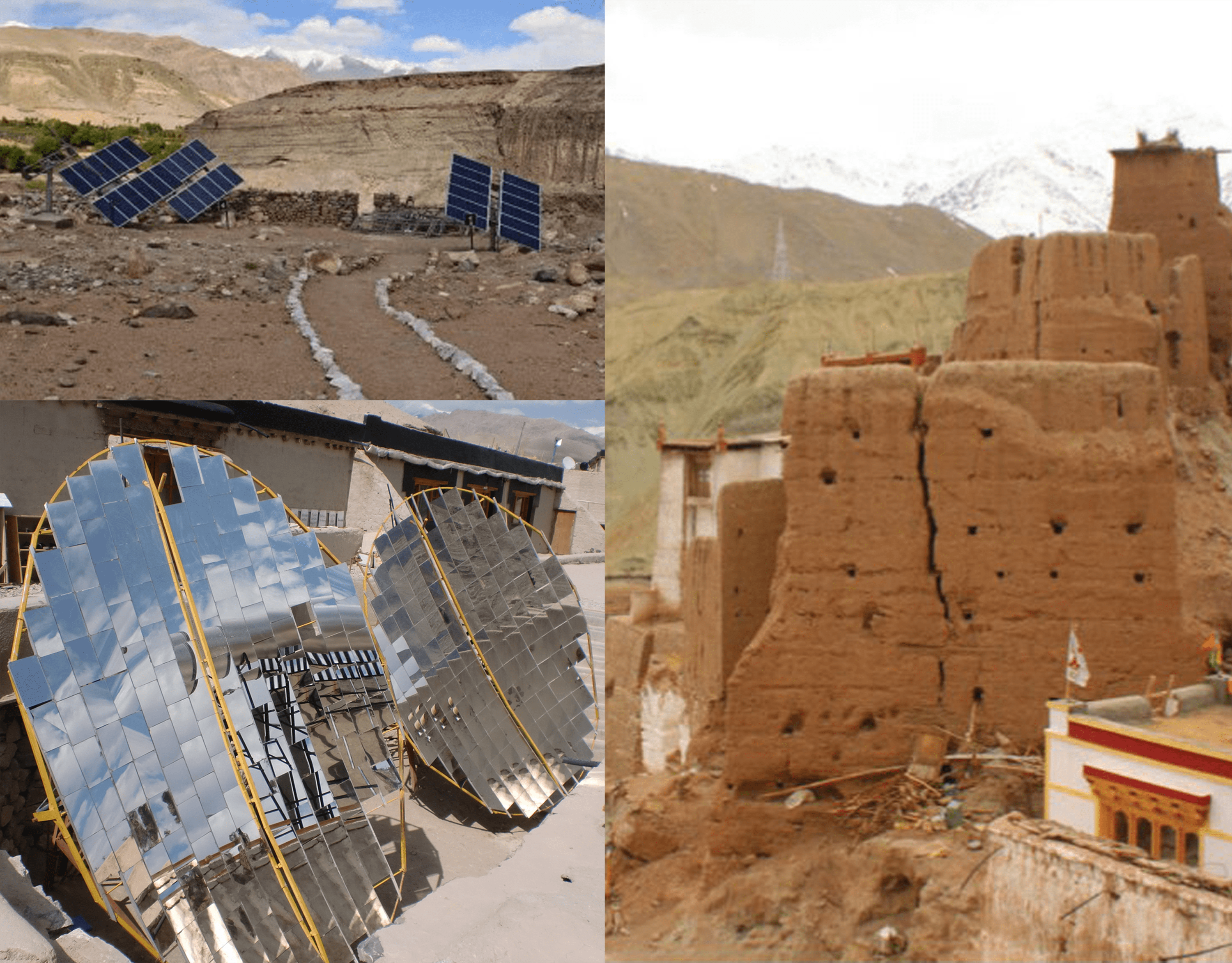
Under WANGCHUK’s guidance, SECMOL students are able to generate renewable energy and develop innovative technologies to address concerns of the school and Ladakh villages.
Seeing how climate change has affected the natural water supply for agriculture, Wangchuk seized on the idea of building artificial glaciers in the form of “ice stupas”—conically-shaped ice mountains that store water in winter and in the summer melts gradually to supply farm irrigation water.
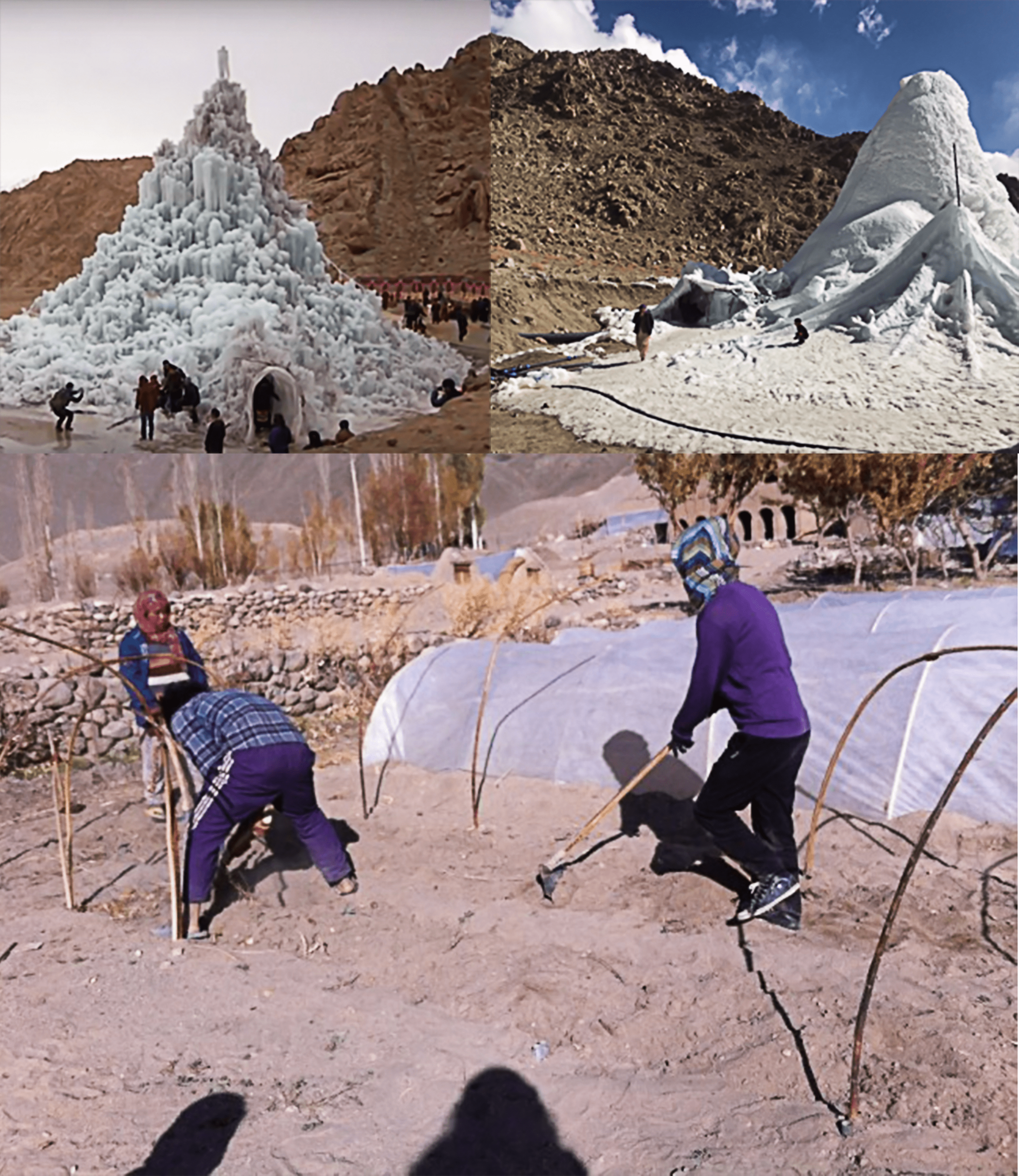
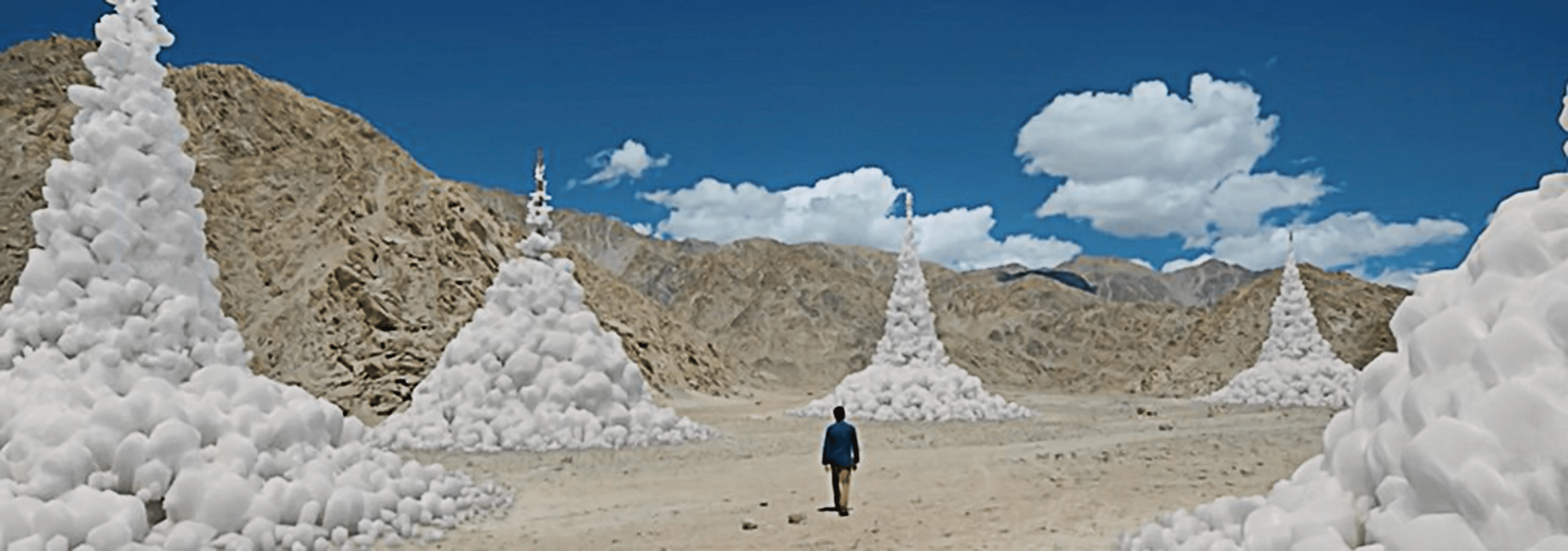
A natural innovator, WANGCHUK works out of local experience and optimistic innovations. He confidently asserts, “The possibilities are endless.”
Ladakh in the northern India state of Jammu and Kashmir, is a high-altitude, cold desert region where some 300,000 people struggle in the midst of a harsh environment, wars arising from the rival claims of India, Pakistan, and China, and now even climate change. Yet here the will to autonomy, creativity, and empowerment remains vibrant.
An inspiring example is SONAM WANGCHUK. Born in the small, remote village of Ulaytokpo in Ladakh, one of many children of a local leader, he had a difficult education because minorities were discriminated against, schools were lacking and poorly-equipped, teaching standards abysmal, textbook content locally irrelevant, and the medium of instruction alien in the mountains. Left mostly to fend for himself, he took control of his life early on.
He was a 19-year-old engineering student at the National Institute of Technology in Srinagar, Kashmir, when he went into tutoring to finance his schooling and help woefully unprepared students pass the national college matriculation exams. Renting a hotel function room, he advertised a coaching program that, exceeding expectations, drew close to a hundred students. Teaching basic subjects like English and Math, using strategies like peer-to-peer teaching, it was a financial success. But the experience also demonstrated to him how poorly educated the students in village schools were.
In 1988, after earning his engineering degree, WANGCHUK founded Students’ Education and Cultural Movement of Ladakh (SECMOL) and started coaching Ladakhi student, 95% of whom used to fail the government exams. To create lasting impact, SECMOL partnered with local government in a joint program of educational reform. Piloted in a village school, the program involved training teachers in a “creative, child-friendly, and activity-based” education; introducing curricular changes to make subjects relevant to the Ladakhi culture and context; prioritizing English over Urdu to better prepare students for higher education; and promoting the Ladakhi language. Village education committees (VEC) were organized to support schools, monitor teacher performance, and become true stakeholders. Successfully piloted, this initiative of “localizing” schools was replicated in 33 schools and became a veritable movement.
In 1994, with WANGCHUK in the lead, “Operation New Hope” (ONH) was launched to expand and consolidate the partnership-driven educational reform program. Taking a life of its own, to date ONH has trained 700 teachers, 1000 VEC leaders, and dramatically increased the success rate of students in matriculation exams from just 5% in 1996 to 75% by 2015. In 1998, WANGCHUK opened SECMOL School, with a permanent faculty, volunteers, and a yearly average of 300 students. An alternative boarding school that offers review, certificate, and associate-level courses, it rebuilds the students’ confidence, develops lifeskills, revisits the fundamentals and offers courses ranging from leadership training to solar power installation. Also a model in its use of renewable energy and indigenous technology, SECMOL has produced students who have gone on to become pioneering entrepreneurs in different fields.
A natural innovator, WANGCHUK works out of local experience. Seeing how climate change has affected the natural water supply for agriculture, he seized on the idea of building artificial glaciers in the form of “ice stupas” for irrigation during the dry summer. Called “stupas” (for public appeal in a Buddhist land), these are conically-shaped ice mountains, that store water in winter and in summer melts to supply farm irrigation water.
Six stupas he and his team have created store roughly 30 million liters of water. Beyond Ladakh, WANGCHUK has shared his environmental and educational innovations with mountain peoples across the whole Himalayan belt, and as far as Switzerland. Simple and non-confrontational in his leadership approach, SONAM WANGCHUK, continues to dream of ways to help the people of Ladakh. He confidently says, “The possibilities are endless.”
In electing SONAM WANGCHUK to receive the 2018 Ramon Magsaysay Award, the board of trustees recognizes his uniquely systematic, collaborative and community-driven reform of learning systems in remote northern India, thus improving the life opportunities of Ladakhi youth, and his constructive engagement of all sectors in local society to harness science and culture creatively for economic progress, thus setting an example for minority peoples in the world.
I humbly accept this award, not as an individual but on behalf of all the students, teachers and people of Ladakh in the trans-Himalayas.
This award is a recognition to our efforts of the last 30 years to make education meaningful, applicable and contextual in our remote mountains and to make it available to all… rich, poor, rural and urban through government school system.
Unfortunately when it comes to education, the world is still stuck with a system that is three hundred years old when at the onset of industrial revolution, the focus was on exploiting nature for human need or greed. A kind of war was declared on nature and our schooling system unfortunately became a training camp for this plunder.
In this war we evaporated half of the forests on earth and half its wild life vanished in just the last 50 years. Nature, too, has responded with equal fury, unleashing cyclones, storms, droughts, floods and made our air unbreathable, water undrinkable, temperatures unbearable.
We suffer the consequences in the mountains of Ladakh, where the glaciers are disappearing, causing droughts and flash-floods.
At our school in Ladakh, we try and come up with measures to respond to climate change by sensitizing each citizen, arming the youth to build solar heated houses, build seasonal artificial glaciers to restore climate-damaged valleys.
Yet people ask in despair how will you scale it up globally? Where’s the money?
Whether we have resources for environment and education depends on how we look at it! There seems to be no dearth of resources when it comes to defence and arms. The world spends 1.7 trillion dollars a year on defence. But defence in future will hardly be about India arming itself against China or China against the US.
It will have to be all countries pooling their budgets for defence—for defence against new environmental catastrophies and climate change.
Let me clarify this: in just one year the world loses 10 million lives to air pollution alone, (this is a rate similar to World Wars I & II) and half of these lives are lost in India and China. And it happens without a single bullet fired from across borders.
So don’t we need to invest in declaring peace with nature, by re-designing our education system to heal the planet and its people.
As a symbol of beginning this peace with nature I want to dedicate the prize money of this award to start an international model school in Ladakh where government and community join hands to prepare our children for these challenges of tomorrow.

